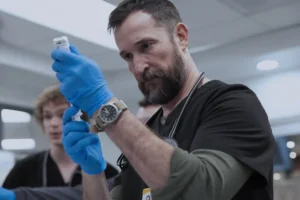Summary
The Ripper is your typical true-crime docuseries, although its shorter-than-usual runtime and focus on such a prominent case make it an engrossing, morbid binge.
The Ripper debuted on Netflix on December 16, 2020.
With a general audience’s enthusiasm for the absolute worst humanity has to offer not waning even for the holidays, right before Christmas seems as good a time as any for Netflix to release The Ripper, a four-part docuseries detailing the heinous crimes of Peter Sutcliffe, aka “The Yorkshire Ripper”, who between 1975 and 1980 murdered 13 women and attempted to murder another seven, all because the voice of God told him to. What followed was one of the largest and most publicized manhunts in British history.
Fun fact: I’m from West Yorkshire, where Sutcliffe operated, and live in the town of Huddersfield, where he plucked a couple of victims. He was caught and charged a decade before I was born, so I have no memory of the manhunt itself, but Sutcliffe still lives in the cultural consciousness around these parts, his exploits a cautionary tale even now. On some level The Ripper seems to be aware of this, helping to build not just a timeline of his movements and crimes but also a sense of his burgeoning media profile, the hostile public response, and the desperate need of a largely inept police force to catch him.

Four episodes seem unusually few for this kind of thing, though that’s not a downside particularly. There’s a clear throughline that tracks Sutcliffe claiming his early victims through a period of increasing confidence until he’s openly antagonizing the police, clearly emboldened by how long and prolifically he was allowed to operate without being caught. With the usual assemblage of interviews and archival materials, we get a sense of not just the investigation’s progress – or lack of it – but the sheer terror that Sutcliffe represented for women in the area. The fact his victims were largely prostitutes undoubtedly informed how the police, public, and media all considered Sutcliffe’s crimes, giving The Ripper a certain enduring timeliness – so much of the true-crime genre, from The Vow to American Murder: The Family Next Door, is built around abuses committed by men against women.
Even at such a clipped runtime, The Ripper could stand to have a tighter sense of chronology, with some temporal deviations that don’t do it any favors. But it’s an efficient, engrossing example of the usual format, and the fact it’s examining such an infamous killer will undoubtedly draw a sizeable audience of true-crime enthusiasts.




